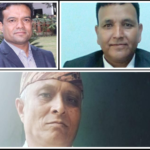CSTO’s military deployment legitimate, necessary to deter extremists, outside forces with evil ambitions
With “constitutional order” in Kazakhstan about to be restored after the government took firm measures to deal with the unrest, which has engulfed half of the country for a few days, and the arrival of troops from the Collective Security Treaty Organization (CSTO), the US and the West rushed to take the chance to play geopolitical tricks by questioning the legitimacy of CSTO’s deployment and hyping the “Russia threat” in an attempt to squeeze its influence in Central Asia.
On Friday, Chinese President Xi Jinping sent condolences to Kazakh President Tokayev for the severe casualties and losses from the unrests. Xi said that Tokayev took affirmative and effective measures at a crucial time, quickly quelled the situation, and showed a statesman’s responsibility to the country and the people.
Xi stressed that China firmly opposes any force that destroys the stability and security of Kazakhstan, opposes outside forces that incite disturbances or color revolution or try to destroy the friendship and cooperation between China and Kazakhstan.
China is willing to offer help that Kazakhstan needs to overcome the current difficulties. No matter meeting what challenges and risks, China is always the trustworthy friend and partner of Kazakhstan, and the Chinese people always stand with Kazakh people, Xi said.
The counter-terrorism operation in Kazakhstan has been raised to “critical red” on Friday. Over 3,000 people have been detained in Kazakhstan in connection with the riots, 26 armed rioters have been killed, and 18 were injured in clashes with security forces, state-run broadcaster Khabar 24 reported on Friday, citing a source from the Interior Ministry.
Analysts noted that CSTO’s military deployment is not only legitimate but also necessary to deter evil terrorist and extremist forces and outside forces that seek benefits from the unrest. They also suggested closer coordination and cooperation between the Shanghai Cooperation Organization and the CSTO to defend regional stability.
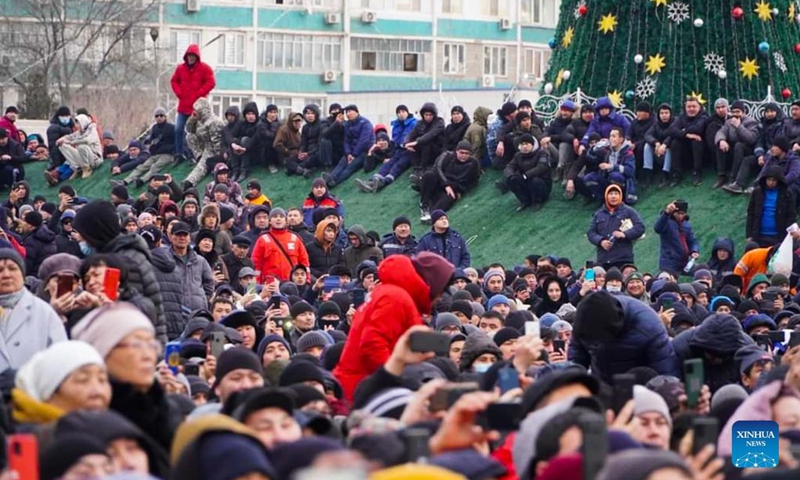
People rally to protest against the price rise of liquefied petroleum gas in Aktau in the Mangystau province, Kazakhstan, Jan. 4, 2022. Kazakh President Kassym-Jomart Tokayev declared a state of emergency in the Kazakh city of Almaty and the Mangystau Region in southwest Kazakhstan on Wednesday. The mounting unrest prompted the Kazakh government to seek help from the Collective Security Treaty Organization, which has decided to deploy peacekeeping forces to Kazakhstan.(Photo: Xinhua)
The unrest, which started as a protest of fuel price hikes in the Mangystau region on January 2 before spreading to half of the country in the following days, seemed to be close to an end despite gunshots being heard in Almaty, the largest city in Kazakhstan, in the early morning hours of Friday, with no police or protester seen on the streets, Kazakh and Russian media reported.
Many countries, including the US and Russia, and the EU bloc have been closely monitoring the situation in Kazakhstan. But after CSTO agreed to deploy troops to help Kazakhstan, the US – together with the Western media – quickly stood up to question the legitimacy of the military deployment and Russia’s involvement in the situation.
The decision by CSTO to deploy military forces is legitimate as it was written in the document of the treaty that CSTO could take actions when faced with threats to national security and sovereignty of member states, Yang Jin, an associate research fellow at the Institute of Russian, Eastern European and Central Asian Studies at the Chinese Academy of Social Sciences, told the Global Times.
Representing the government, Kazakh President Tokayev made the request to the CSTO Collective Security Council and the decision was made after a full discussion by member states, Yang said, noting that the decision to deploy military forces is not made by one country but member states as a whole.
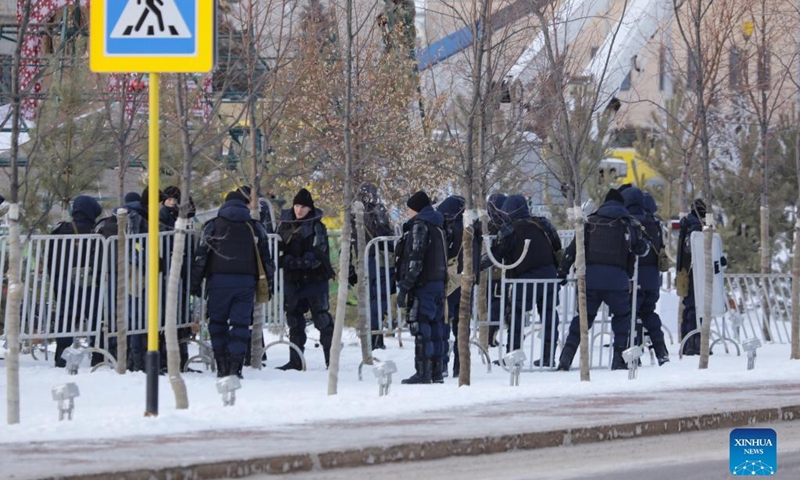
Obstacles are settled in front of the city hall for curfew in Nur-Sultan, Kazakhstan, Jan. 6, 2022. Kazakh President Kassym-Jomart Tokayev declared a state of emergency in the Kazakh city of Almaty and the Mangystau Region in southwest Kazakhstan on Wednesday. The mounting unrest prompted the Kazakh government to seek help from the Collective Security Treaty Organization, which has decided to deploy peacekeeping forces to Kazakhstan.(Photo: Xinhua)
A statement released by the CSTO on Thursday said the CSTO Secretariat confirmed the receipt of an Appeal for Assistance by the Republic of Kazakhstan. “The Appeal states that this situation is seen as an invasion by gangs trained from abroad.”
One purpose for CSTO is set to defend the regional stability and it responded quickly to Kazakhstan’s appeal because if the riots were not effectively curbed, they would have not only severely destabilized Kazakhstan but also the entire region, and the longer they carried on, the deeper outside forces could get involved, Yang said.
The latest developments of the chaos have been manifested with signs of color revolutions while the US and West are eager to use the opportunity to weaken Russia’s influence in Central Asia, Yang said, noting that, “by deploying troops, CSTO also wanted to deter outside forces and the terrorist forces that want to seek benefits from the current situation.”
Yang noted that videos on the chaos uploaded online showcased how dangerous the threats had become with weapons being handed to demonstrators and clashes with police seemingly organized.
The initially peaceful protests quickly turned radical, especially in Almaty with demonstrators storming administrative institutions, setting fire to cars and buildings, and confronting the police. Video shows beaten soldiers who were left behind and some people driving cars into officers. One police officer was reportedly found beheaded in the unrest.
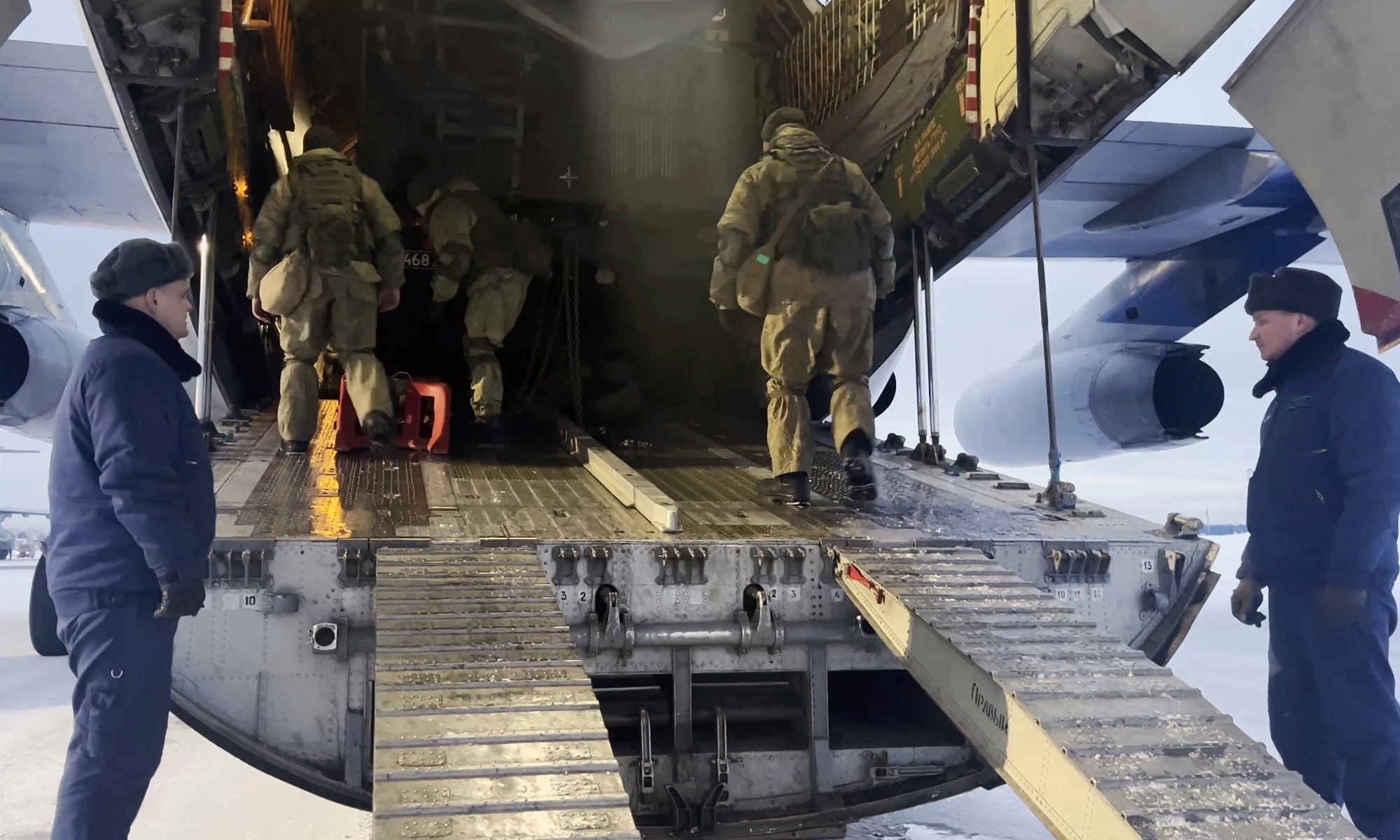
Russian airborne troop units depart aboard Russian Aerospace Forces aircraft to join the Collective Security Treaty Organization’s (CSTO) peacekeeping force in Kazakhstan. Kazakhstan’s President Tokayev has declared a two-week state of emergency over mass unrest in the country and asked the CSTO for assistance. Photo: The Paper
Andrey Kortunov, director general of the Russian International Affairs Council, wrote to the Global Times that the decision of Russia and its Central Asian allies to meet the request of the Kazakhstan authorities and provide military assistance is an important gesture of political support and solidarity.
If it turns out that there is indeed an infiltration of extremist and terrorist groups from abroad, an international cooperation in suppressing such groups may become critically important, Kortunov said.
Moreover, Pan Guang, director of the Center of SCO Studies of the Shanghai Academy of Social Sciences, told the Global Times that it is possible that extremists could have been involved.
He pointed out that during a similar incident – protests and later clashes between police officers and local workers in the Manjystau region over salaries in 2011, a religious extremist organization was found to be behind some radical actions. Detailed information on the forces behind the current chaos in Kazakhstan has not been disclosed but forces promoting separatism, terrorism and extremism may have been involved.
On Friday, Kazakh President Tokayev said that the constitutional order in Kazakhstan had been restored and the situation was under control. The troops from the CSTO have arrived and are helping to restore order, Kazakh media reported.
Although the situation in Kazakhstan is under control, the unrest will have more impacts: it has destroyed the image of Kazakhstan as a stable country and proved to both Kazakhstan and regional countries that stability and security in the region is still fragile, analysts said.
Out of concern for security and political needs, countries in Central Asia may work toward closer relations with Russia and be more alert for interreference from the US and West, while the US and the West may pour more money and efforts into these areas to compete with Russia and contain China, Yang said.
Moreover, as Kazakhstan and many Central Asian countries are also members of the Shanghai Cooperation Organization, SCO member states could also strengthen cooperation on countering dangerous forces and defending regional stability, Yang said.
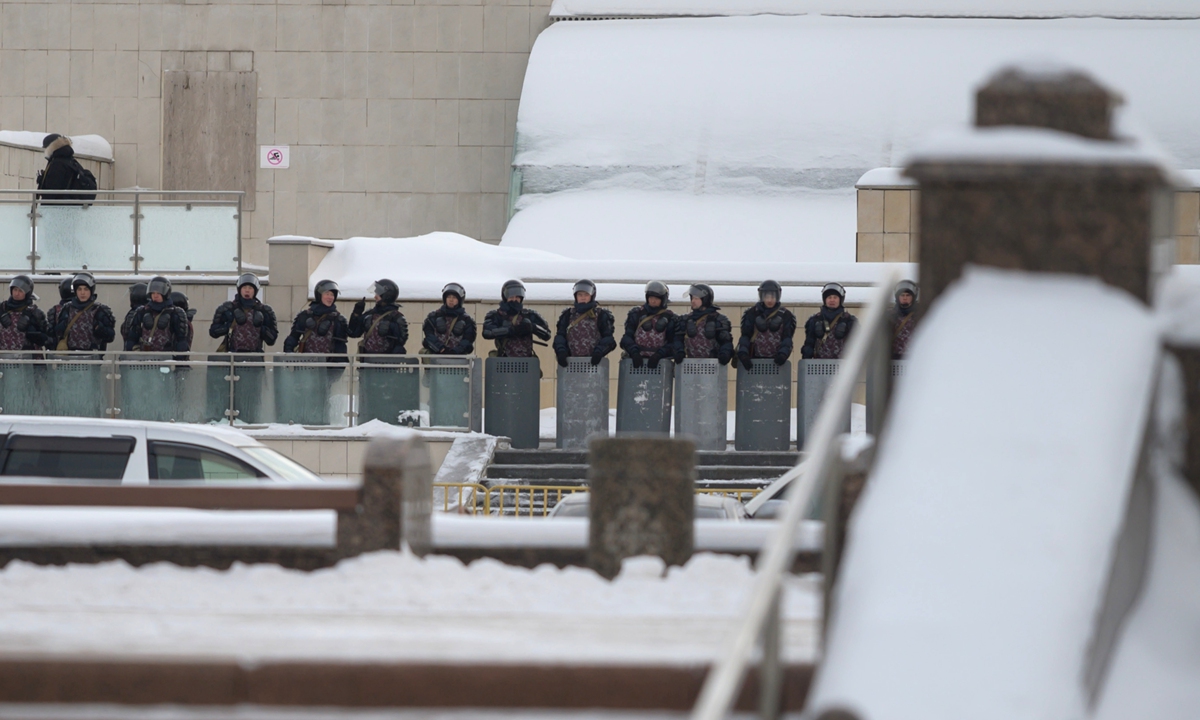
Photo:VCG
In response to questions on what the SCO could do for Kazakhstan, an SCO member, Chinese Foreign Ministry spokesperson Wang Wenbin told a press conference on Friday that China and other SCO members are closely monitoring the situation in Kazakhstan and believe it can properly deal with the problems.
We also support Kazakhstan to stabilize the situation and are willing to promote the SCO to play a positive role, said Wang, noting that China supports all efforts that would help Kazakhstan to quell the situation and firmly opposes outside forces that incite social disturbance and violence in Kazakhstan.
Pan noted that stability in Kazakhstan will also influence China’s Northwest region, especially the Xinjiang region. It is worrisome on whether the chaos in Kazakhstan will spill over into other countries in Central Asia, as outside forces and extremism could infiltrate the region via the internet and incite trouble through videos and words.
We need to closely monitor all changes in the region, including in Afghanistan, said Pan.
People rally to protest against the price rise of liquefied petroleum gas in Aktau in the Mangystau province, Kazakhstan, Jan. 4, 2022. Kazakh President Kassym-Jomart Tokayev declared a state of emergency in the Kazakh city of Almaty and the Mangystau Region in southwest Kazakhstan on Wednesday. The mounting unrest prompted the Kazakh government to seek help from the Collective Security Treaty Organization, which has decided to deploy peacekeeping forces to Kazakhstan.(Photo: Xinhua)


